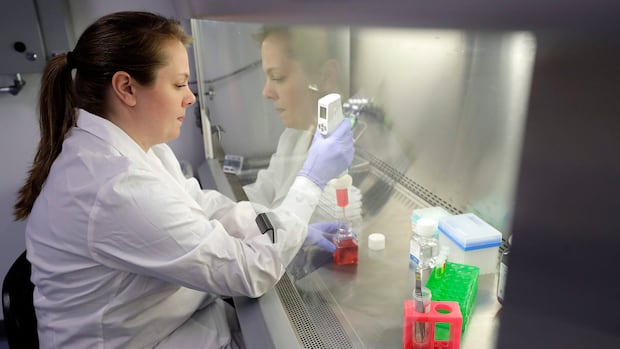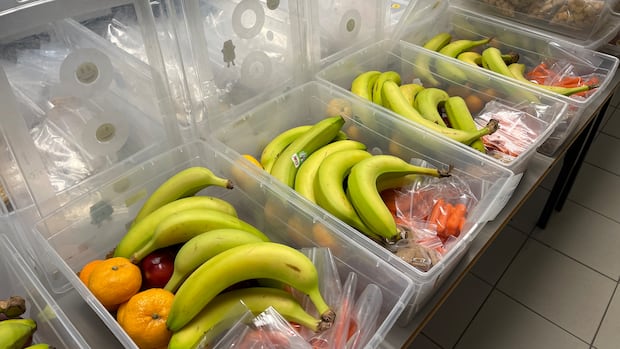Adam Davidson-Harden is admittedly a latecomer to appreciating William Shakespeare, but the Ontario high school teacher now likens studying the Bard to “lifting weights, for language.”
He said he worries that mental muscles aren’t getting a workout these days if students lean on shortcuts like generative artificial intelligence for schoolwork.
When Davidson-Harden queried a student about a recent assignment on The Tempest that included a non-existent quote, the student admitted to using GenAI “to avoid the messy and slower process” of sifting through the play, the English and social studies teacher from Kingston, Ont., said.
That student lost a valuable opportunity, he said: engaging with the content, formulating an opinion, finding support for their perspective and stringing together sentences to express it.
“If students or teachers overrely on GenAI to perform tasks that involve thinking critically for them … they’re losing an opportunity to improve their skills and to think creatively.”
Technology is an integral part of schooling today, but when students use ChatGPT to complete assignments or scroll TikTok to research topics, what’s happening to their cognitive skills? Concern that dependency on technologies like generative AI and social media will impact young people’s thinking and development has some educators urging caution.
In schools, “foundational opportunities to mess around with language and think and react and explore should be insulated,” Davidson-Harden said.
An early adopter of educational technology who now teaches online, he said certain tools have been beneficial, yet “we’ve now reached a point where … bland technology acceptance is maybe not the right move.”
‘Difficulty with focus and concentration’
Childhood is a sensitive period of development “where we’re gaining a lot of foundational skills,” said Emma Duerden, an associate professor in the faculty of education at Western University in London, Ont., and Canada Research Chair in Neuroscience and Learning Disorders.
When we spend large amounts of time doing something — whether it’s playing tennis or studying German — it influences our thinking and behaviour, she said.
If you’re scrolling social media apps for three, eight or even 12 hours a day — as some Western students admitted to in response to a recent study by Duerden’s team — it can be a problem for young brains.
“We’re seeing university-age kids that are having difficulty with focus and concentration because they’re always used to scrolling and to getting information quite rapidly,” she said.
Endless social scrolling — including split screens that jam ever more content into frames — could be considered similar to the divided attention brought on by multitasking, Duerden said.
Emma Duerden, a Western University associate professor and Canada Research Chair in Neuroscience and Learning Disorders, outlines how social media really taps straight into teens’ developing brains.
“Doing two or three things all at the same time, where people have the psychological impression that they’re getting more done … is associated with high levels of mental fatigue,” she said.
Multitasking triggers the release of reward chemicals in the brain — one of which is dopamine. Too much “can in turn lead to a kind of state of confusion [and] brain fog,” Duerden said. “Long-term multitasking is actually associated with cognitive difficulties later on.”
Social media can benefit students by making connections or exposing them to new content or ideas, the researcher said, but she urges keen attention to its overuse, which can lead to harmful effects like increased anxiety.
GenAI is another technology the education community is grappling with, as enterprising students flock to it and educators seek guidance and training, while researchers explore whether the convenience it allows for can impact the development of critical thinking or have consequences on recall and other cognitive activity.
Cognitive offloading — using an external aid to support an internal process, like scribbling a shopping list on a piece of paper instead of remembering it — isn’t new, but the use of GenAI to do so is being hotly debated.
When offloading, the idea is you free up mental resources to be redirected elsewhere, but there can be costs. What if, for instance, you lose that slip of paper or the GPS directing your driving route loses its connection?
As artificial intelligence becomes a more popular tool, many teachers in Canada are looking for clearer instructions and policies on how to use it effectively in the classroom.
Replacing skills with a tool can mean losing them
“For those kinds of skills that require that kind of intentional effort to develop and maybe even practise, replacing those activities with a tool may put us in a position where we’re not developing [them],” said Evan Risko, a professor in the University of Waterloo’s psychology department and Canada Research Chair in Embodied and Embedded Cognition.
This isn’t necessarily a bad thing, Risko said, since offloading may result in losing some cognitive skills, but it paves the way to developing new ones. What’s key, however, is how that newly freed-up mental capacity is used.
“The hope is that our students can use [GenAI applications] productively … and use them in a critical manner, right? To think hard about what the tool is doing well and what the tool is not doing so well.”
Joel Heng Hartse, a senior lecturer in the faculty of education at Simon Fraser University who leads a program teaching new students academic reading and writing, said he believes educators must underline how GenAI actually works and “let a student know, ‘Hey, this isn’t like a fact machine. This is a probability machine,'” he said from Burnaby, B.C.
While he said it too early to tell if ChatGPT and its ilk have impacted young minds or learning capabilities, his students have nonetheless shared that they feel “lazier now because they know they can take shortcuts with AI,” he said.
If more students turn to GenAI for writing, Heng Hartse worries about a flattening of opinions as fewer students practise expressing their unique voice, which he considers the very point of learning to write, read through texts and construct arguments to support one’s views.
Joel Heng Hartse, who oversees a Simon Fraser University program teaching academic literacy to new students, talks about why he’s not looking for perfect papers.
“In academia, we want friction. We want struggling with difficult things. So are [students] losing their abilities to do these things? I think they’re making choices — some of them — to not develop those skills,” he said.
Like Ontario teacher Davidson-Harden, Heng Hartse also used a weight-training analogy for emphasis. “If the goal is the weights need to be lifted, you can do that or a weightlifting robot can do that,” he said.
“But if the goal is for you to develop and to build muscle and for you to work on your fitness, the robot lifting the weights did the thing, but there was absolutely no benefit to you.”










